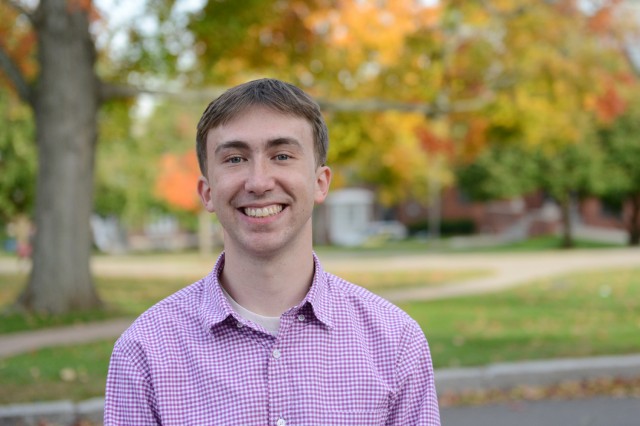Government’s Dancey Teaching Course on Campaigns, Elections

Assistant Professor of Government Logan Dancey started teaching at Wesleyan this semester—the perfect time, he says, to be teaching a course on Campaigns and Elections.
“The unfolding presidential and congressional elections continually give us new events to think about as we read and discuss broader theories about the importance and meaning of campaigns and elections,” Dancey says. And though Congress has mostly ground to a halt this election season—meaning a dearth of current events to discuss in his Congressional Policymaking class—the increasing polarization in Congress has led to many interesting and important discussions in that course nevertheless.
Dancey describes the students in his classes as “intellectually curious.”
“They ask great questions and consistently show a desire to really understand a concept or theory. The students definitely keep me on my toes, but ultimately it makes class discussion more interesting and thought-provoking,” he says.
Dancey first arrived at Wesleyan in July from the University of Pittsburgh, where he spent a year and a half as a postdoctoral associate. There, he worked on research related to Congress and public opinion, while teaching one class per semester in the department of political science. Prior to that, he was at the University of Minnesota, where he earned a Ph.D. in political science in December 2010.
It was Dancey’s undergraduate experience at another liberal arts college, the University of Puget Sound, that drew him to Wesleyan.
“The opportunity to teach small classes filled with engaged and intellectually curious students is really rewarding,” he says. “The government department—like Wesleyan as a whole—also has an excellent mix of faculty who are committed to both their research and teaching. The mix of great colleagues and students makes Wesleyan a vibrant place.”
The University of Puget Sound is also where Dancey’s interest in political science really blossomed. “I benefited from having excellent teachers who furthered my interest in the topic,” he says.
Dancey previously has published articles in the American Journal of Political Science, Political Research Quarterly, and Political Behavior, among other journals. His research focuses on the U.S. Congress and public opinion, with much of his work situated at the intersection of these two subfields in political science.
“I am particularly interested in public cynicism about politics—and Congress in particular—and the effect this has on the political system,” he explains. “For example, challengers in congressional races often present themselves as Washington outsiders in an attempt to capitalize on public dissatisfaction with the institution. I ask whether candidates who win as outsiders behave differently than other members once they enter the institution. In a lot of cases they do, although the differences do not always persist over the course of a member’s career.”
Dancey notes that his specific focus on public dissatisfaction with Congress grew out of the negative views of politics people typically express when they find out he is a political scientist. “Hearing people routinely express cynicism about Congress sparked an interest in understanding how members of Congress try to address this cynicism, if at all,” he says.
Outside of work, Dancey, his wife and their 10-month-old daughter are enjoying getting to know Middletown and finding favorite restaurants in the area. “We spend most of our nights at home now that we have a daughter who falls asleep early, so we’re avid Netflix watchers,” he says. “I am also a basketball fan and try to watch as many Portland Trailblazers games as possible.”

